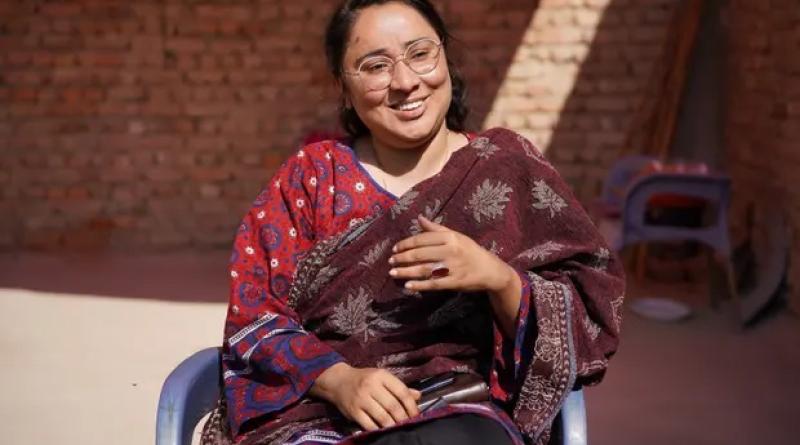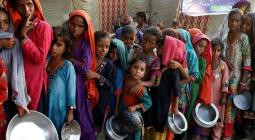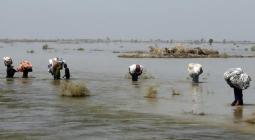I couldn’t sleep. I cried at night. But I had to help the women devastated by the floods in Pakistan

When the rains came last autumn, I was among the millions made homeless in Sindh province. Here is why – months later – I am still helping to patch up ruined lives
The floods in Pakistan last year were frustrating, heartbreaking and on a scale unseen in my lifetime. Hundreds of thousands of homes collapsed, streets were inundated and millions of people were made homeless.
My home in Naseerabad, a town in the Qambar Shahdadkot district of Sindh province, was flooded and unlivable. With my children and husband, I moved to my mother’s house. We were four families living in one room – my sister, brother and their children too. More than 20 people were living under one roof, which we worried would collapse on top of us. But I was lucky to have a place to stay. Millions didn’t.
I immediately became involved in relief work. The first move of the Women Democratic Front was giving financial assistance to widows, older women and those with health issues who now had no financial support at all. We helped 85 women initially.
Soon we learned of other needs after visiting camps set up along the district’s highways. Women, particularly pregnant women, and children were worst affected. Many arrived at the camps with only the clothes they were wearing when the rains came.
We gave them something to wear. We gave out sanitary towels. We gave children toys to help relieve the boredom and take their minds off what was happening.
There were no female toilets at the camps. Women told us they would go to the washrooms in groups at night. They lived in fear of being sexually abused or harassed by others at the camps.
Female students at a college in Naseerabad chose to sleep inside the building rather than outside. I asked one of them: “What if the roof falls down?” She replied: “We are constantly afraid that the men might make advances on us if we sleep outside. It is better to die than to be sexually abused.”
It was pregnant women who seemed most in need. They had little access to medical care. The regular check-ups they should have had stopped with the flood waters. I told one that she should take medicine to help with her pregnancy. She replied: “We don’t have food. How can we have medicine?”
Seeing the need, we quickly arranged for a huge medical camp to be set up, with six doctors and specialist women healthcare workers to see patients and distribute medicine. More than 300 people attended in the days after it opened.
During the early days of the relief effort, I couldn’t sleep at night after going to the field. I found it traumatic. I felt helpless not being able to support all the women who needed it.
I have been disappointed with the government, which I think has been ineffective in reaching out to people. The Sindh government had the resources but they did not work well.
I would share the women’s stories with my husband. I often cried at night. But at least I felt I was doing something.
And there was some light in this grim situation. In one village I visited, some women had got hold of a television and managed to connect it to the power. In a tent outside in the village, women gathered together to watch TV dramas and, for a moment, to forget. A young women told me: “Everyone is worried here, and we took this step to lighten up their moods and make them smile.”
Months on from the floods, we are still working. The water is still here and it can get cold. Many families – including mine – have now returned to their dilapidated homes, living in tents within the shells of their buildings. Before they went, we gave them clothes and blankets. And we’re still doing that. This week, we’ll be giving out about 60 blankets to families in one village. The work goes on.
As told to Shah Meer Baloch
COVER PHOTO: Abida Channa finds ‘some light in a grim situation’ as relief work continues months after last year’s terrible monsoon. Photograph: Shah Meer Baloch





